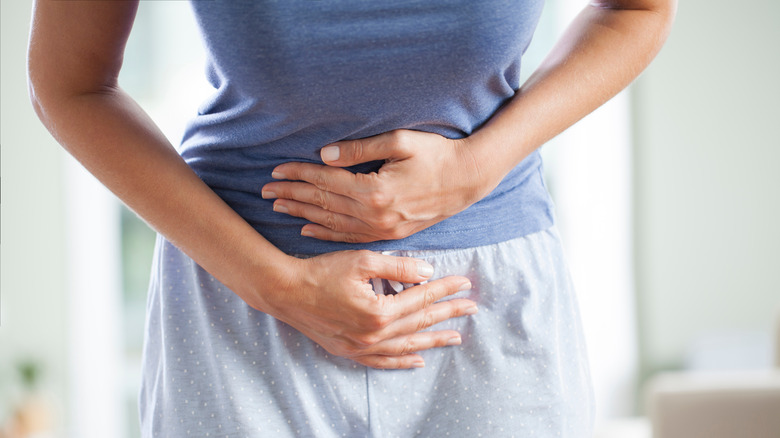What Is Water Weight And How Can You Get Rid Of It?
Our weight can vary slightly from day to day for a variety of reasons. One of these reasons could be that you may be retaining water weight. While water normally makes up 50 to 65% of a person's total body weight, water weight refers to a buildup of excess water in the body (via Women's Health). This can be caused by a number of factors, including dehydration, menstruation, or a high-sodium diet.
When you're dehydrated, your body stores and holds on to as much water as possible in order to prevent severe dehydration. "Water weight gain is our body's way of protecting itself against dehydration, because our body can only survive for a couple of days without water," Erica Zellner, a health coach at Parsley Health in California, told Women's Health.
As a result, your body retains and recovers water that would typically go to your kidneys and stores it in your tissues instead (via WebMD). "This water retention and recycling of water through urine can cause puffiness and bloating," Zellner adds. Maintaining a high-sodium diet can also cause your body to retain excess water. That's because, in response to an increased intake of salt in your diet, your body stores more water in your joints and tissues to balance out the increased sodium levels in your system. This balance is needed in order for your body to function properly.
How to lose water weight
If you're wondering how you can lose water weight, look no further. There are a variety of simple and healthy steps you can take to reduce water retention. For instance, one of the easiest ways to lose water weight is to reduce your sodium intake (via Medical News Today).
Consuming too much sodium can disrupt the natural balance between water and sodium in the body, causing your body to hold excess water. That's why it's important not to consume more than the daily recommended intake of 2,300 milligrams of sodium per day. You can keep this balance in check and reduce your daily sodium intake by limiting or cutting out high-sodium foods. When doing so, be on the lookout for food items that you wouldn't normally think would be high in sodium such as breakfast cereals and salad dressing (via Centers for Disease Control and Prevention).
You can also lose water weight by staying hydrated. Believe it or not, drinking plenty of water and fluids can actually improve kidney function and prevent your body from storing extra water. Ideally, the average adult should drink at least two liters of water a day.


